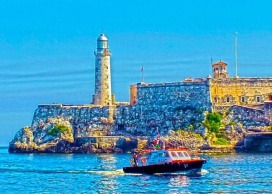
Havana ephemeris. October 18.
1901. The José Martí National Library is founded in Havana.

It is currently the governing body of the National System of Public Libraries of Cuba, made up of more than 400 libraries distributed throughout the national territory. It compiles, processes and safeguards the historical memory of the country and has for this purpose a bibliographic collection of three million documents that it guards, investigates and promotes. It acts as a repository of the National Bibliographic Heritage.
The “José Martí” National Library is located in the Plaza de la Revolución, which is also identified with the name of the National Hero of Cuba.
1912. Mirta Aguirre is born in Havana.

With the course of her existence, she became a relevant poetess. She was described as one of the most comprehensive, coherent and lucid female figures in Latin America. She wrote children's poetry, some of which has been set to music.
She also worked as a translator and editor, radio and television scriptwriter, as well as Head of the Film, Theater and Music Section of the newspaper Hoy
She worked as a professor at the School of Letters and Art of the University of Havana and was Director of its Department of Hispanic Language and Literature.
Her death occurred in the Cuban capital on August 8, 1980.
1967. The solemn evening in homage to Commander Ernesto Che Guevara was held in the Plaza de la Revolución “José Martí”. At the close of the evening, which was attended by around a million Cubans, Commander in Chief Fidel Castro stated: “

“Che did not fall defending another interest, defending another cause than the cause of the exploited and the oppressed in this continent; Che did not fall defending a cause other than the cause of the poor and humble of this Earth. And the exemplary way and the selflessness with which he defended that cause does not even dare to discuss it the most bitter enemies of him.
"And in the face of history, the men who act like him, the men who do everything and give everything for the cause of the humble, each day that passes they grow bigger, each day that passes they delve deeper into the hearts of the poor. peoples.”
1974. Commander in Chief Fidel Castro speaks at the XXV meeting of the General Council of the World Federation of Trade Unions held in Havana.

He expresses: “Capitalism and imperialism are experiencing a time of crisis today. Not even the most optimistic of the ideologues of bourgeois societies can silence their skepticism and gloomy predictions. No one can predict when and how the inflationary spiral of unprecedented proportions into which the capitalist world has entered will come to a standstill. No one knows how the situation of recession in production, uncontrollable chaos in the international monetary system, growing unemployment, ecological crisis caused by the destruction of the environment, and extraordinary sharpening of class contradictions and conflicts, will stop and to what extent. social in general, which has been aggravated for some time by the appearance of the so-called energy crisis.”
1979. Virgilio Domingo Piñera Llera dies in Havana.

He was a Cuban poet, narrator and playwright considered one of the most original authors of literature in our country.
Graduated with a Doctor of Philosophy and Letters from the University of Havana, he founded the magazine Poeta in 1942.
Among his works is Electra Garrigó, created in 1948, considered as the door that opens to a modern sense of theater in Cuba. In 1968 he obtained the Casa de las Américas Prize in the theater genre for his work "Dos Viejos Pánicos", published that same year.
During the last years of his existence he continued to write and attended gatherings of writer friends, in which his creative spirit was maintained.
He was born in the city of Cárdenas, Matanzas province, on August 4, 1912.
1986. The Hermanos Saiz Association is created. (AHS).

It was founded from a group of creators and members of the then Brigade that also bore the first surname of Sergio and Luís, young brothers from Pinar del Río who were assassinated by forces of the dictatorial regime of Fulgencio Batista on August 13, 1957 in the town of San Juan y Martínez in the province of Pinar del Río.
Members of the so-called Nueva Trova Movement and the Raúl Gómez García Brigade of Instructors and Promoters also formed part of the initial nucleus of the Association. The Association has fostered reflections and the development of activities that have contributed to enriching Cuban culture and also guaranteeing the active participation of young people in this regard.